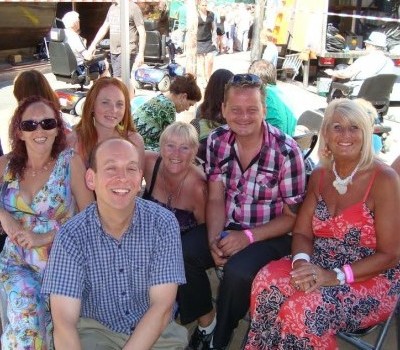16th December 2013 Madrid, Spain
Being in Benidorm, and being in “Benidorm”
On a recent trip to our Consulate in Alicante I was able to squeeze in a one night stay in Benidorm. Alicante is very important to us given the high numbers of British nationals who live and holiday there.

In fact, a quarter of the 14 million Brits who come to Spain for their holidays each year head for the Alicante region. So we have a sizeable Consulate. It is one component of our network across Spain: 9 consulates offering assistance and advice to the Brits who visit – or who live here permanently (we estimate there are around 800,000); and 13 Honorary Consuls. In total, over 200 people work for the British Government in Spain – most of them based outside of Madrid.
The Alicante Consulate is one of the busiest anywhere in the world. Last year it handled over 1,000 consular assistance cases and issued over 1,000 emergency passports. While I was visiting a young lady brought in her passport which had been mangled beyond recognition by a dog. The Consulate were able to prepare an emergency passport for her within the hour, so that she could fly back to the UK that afternoon (but please do look after your passports!).
The Alicante Consulate also looks after Benidorm. Over 1 million Brits holiday there every year. 6,000 live there permanently. It is a particular priority for us. Our team work closely with the local authorities – especially Mayor Agustin Navarro – to provide assistance to those who encounter problems, prioritising those who need our assistance most.
So I wanted to see and experience Benidorm for myself.
It is a remarkable place – a small slice of the UK beside the sea in Spain. Astonishingly, it has 38,000 hotel rooms and over 330 high-rise buildings (many of them hotels). The vast majority of people who visit have great holidays. A few sensible precautions – eg. taking out travel insurance and getting an EHIC (European Health Insurance Card) before you travel – can make all the difference if things should go wrong.
As it happened they were filming the next season of the “Benidorm” comedy series while I was in town. The show’s creator, Derren Litten, very generously agreed to take the risk of giving me a role as an extra.
Waiting around between scenes gave me the opportunity to spend lots of time talking to my fellow extras – most of whom were long-term Benidorm residents. It was fascinating hearing how they had taken the courageous decision to set up new lives in a foreign country. Many were very active in the local community, including the voluntary sector.
I learnt a lot about the challenges of starting anew overseas, alongside the wonderful opportunities that settling in Spain still offers. They gave me some good insights into how they manage when things are not so good and how the Embassy in Madrid, and the Consulate in Alicante, could help. For example, we have been advising people on the pros and cons of buying property in Spain – given a recent spate of cases where Brits found the properties they had bought in good faith did not have the necessary planning permissions.
My fellow extras were also very generous with their guidance on being “an extra”. Above all, they said, “always go to the toilet whenever you have the opportunity to do so, even if you don’t really want to”.
That also happens to be one of the golden rules of diplomacy. And was sound advice.
When we actually got to the point of filming a scene (in “Neptunes Bar”) my first role was to walk through the background. The walking was the easy bit. But then what? The cameras were still rolling but, having walked, I had nothing else to do. I looked around me. There was no music playing, but all my fellow extras were looking in the direction of the stage, tapping their feet, clicking their fingers, some were even dancing. I realised the music track would be added later. Not wanting to look out of place I started to twitch, rhythmically, in time with the imaginary music.
“Cut!”. That was just one take. I walked several times, getting better at walking and twitching each time.
In the next scene my role was to lean – but I discovered I wasn’t a natural leaner. I was given half a pint of beer (even though it was only 8.30 in the morning) in an attempt to make my leaning look better. But it was no good. Then someone who had clearly noticed my talent for rhythmic twitching suggested I might be better off swaying rather than leaning.
So that was my role, for the rest of the morning: swaying to music I couldn’t hear holding a beer I couldn’t drink. It was great!
My brief trip to Benidorm gave me an invaluable insight into the town – and how well we work with the local authorities and volunteer organisations to help Brits who encounter problems. It also gave me the opportunity to more fully understand the joys, and the realities, of living and working in Spain that many hundreds of thousands of Brits experience every day. We now have a Twitter channel (@BritsliveSpain) and Facebook page (Brits living in Spain) dedicated to the issues relevant to British nationals resident in Spain.
As for my glimpse of superstardom – you can judge my walking, twitching and swaying for yourself when the new series of “Benidorm” is broadcast in January next year.